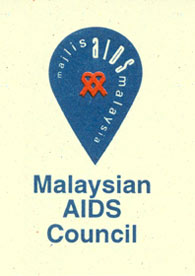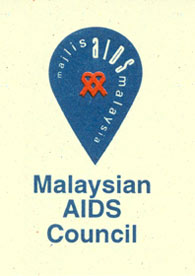The first AIDS case in Malaysia was detected in December 1986. By the end of April 1995, the number of reported HIV cases was 12,122. As of June 2001, there were 40,877 reported HIV cases. In about six years, the number of cases has quadrupled!

While the Malaysian AIDS Council is spearheading the current non-governmental organisation (NGO) response to AIDS in Malaysia, the earlier response has come largely from community groups.
In 1987, a gay community-based organisation in Kuala Lumpur, the Pink Triangle (now known as PT Foundation) launched Malaysia's first NGO response to AIDS by starting a telephone counselling and information service. The service was initially aimed at gay men in the city but it grew over the years to serve the wider community.
Pink Triangle was also the first Malaysian NGO to implement HIV prevention activities with marginalised groups such as transsexuals and injecting drug users. Volunteers from the organisation roamed the streets of Chow Kit, the notorious red-light district of Kuala Lumpur, to hand out HIV information and condoms.
Realising that HIV prevention is intimately linked with care for people living with HIV/AIDS, Pink Triangle started the Positive Living programme in 1989. The programme reaches out to people infected and affected by HIV/AIDS by providing peer support and care.
As HIV/AIDS became a more obvious problem in the country, several other NGOs began to take on HIV prevention and care work. Among them were NGOs working with drug users (Pengasih), migrant workers (Tenaganita), youths (Federation of Family Planning Associations of Malaysia) and women (AWAM). Now, the Malaysian AIDS Council has 35 NGOs affiliated to it, including faith-based organisations such as the Malaysian Consultative Council on Buddhism, Christianity, Hinduism and Sikhism. The latest addition to the Malaysian AIDS Council stable is the Women and Health Association of Kuala Lumpur (WAKE) which provides shelter for HIV-positive women and children.
In contrast to the NGO response, the governmental sector response to AIDS in the early years of the epidemic has been somewhat slow, patchy and ill-informed. Often constrained by political considerations and cultural and religious barriers, government agencies fight shy of talking about sex education, condom promotion and other harm reduction measures that save lives. Instead we see huge billboards proclaiming AIDS Pembunu" (AIDS Kills) and we hear politicians and healthcare workers moralising and judging the infected.
In the early 1990's, things begin to change for the better when a few enlightened government doctors advocated for a stronger public sector response. The Ministry of Health sent doctors abroad to learn about HIV/AIDS management. Trainings on HIV/AIDS counselling were conducted for healthcare workers in public hospitals.
When Marina Mahathir, the daughter of the Malaysian Prime Minister, assumed the presidency of the Malaysian AIDS Council, dialogues with various government agencies were held regularly. As a result of this, more government commitment was gained towards the fight against AIDS.

Such a declaration of committment would be meaningless if it remains on paper and is not translated into action. To translate it into action requires the participation of all sectors in the country, not just the NGOs and governmental organisations. The business sector and religious instituitions need to be involved too.
To-date, the business response to AIDS in Malaysia has largely been in the form of donating funds to support the work of NGOs. Very few businesses have adopted a policy on HIV/AIDS in the work-place. Fewer still have implemented on-going HIV/AIDS education and support programmes for their employees. The Body Shop and Levi Strauss are the two notable companies that have mounted a positive response to AIDS.
Religious leaders have yet to come to grips with the epidemic and its often controversial issues. However, recently, a group of Malaysian imams (religious leaders) undertook a study tour to Uganda to learn about its Islamic response to HIV/AIDS. It's with this sort of exposure that AIDS activists hope that the religious leaders would not follow the footstep of their brothers in the southern Malaysian state of Johor in issuing a controversial fatwa (edict) requiring all Muslim couples intending to get married to be tested for HIV.
The challenges ahead for Malaysia in its fight against HIV/AIDS are numerous.
One, breaking down the cultural and religious barriers that prevent frank discussions about sex and sexuality would be a daunting task.
Two, there is an urgent need to address the issue of the large number of injecting drug users who are already infected with HIV (80 % of reported HIV cases) and to prevent many more from being infected through the sharing of needles.
Three, apart from the programmes that target vulnerable and marginalised groups, heterosexual men need to be educated about their roles and responsibilities in HIV prevention.
Four, getting the religious authorities to support HIV harm reduction programmes and to care for people living with HIV/AIDS.
Five, coordinating a multi-sectoral response to AIDS would be a monumental task.
Unless these challenges - and many more - are overcome, Malaysia should not claim that it has done enough to fight the HIV/AIDS epidemic.
Khim Yee Chong is a trainer in HIV/AIDS, sexual health and sexuality issues in Malaysia.











 Printable Version
Printable Version










Reader's Comments
Be the first to leave a comment on this page!
Please log in to use this feature.